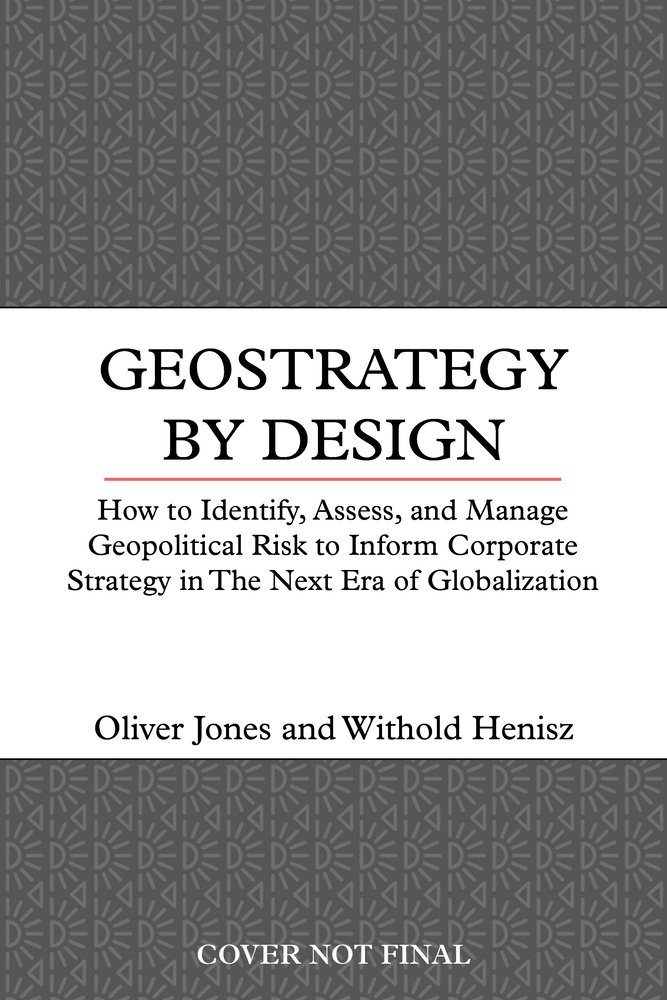Geostrategy in Practice
How to Manage Political Risk in a Shifting World Order

From leading geostrategy experts comes an indispensable guide for executives seeking to thrive and create long-term value in the next era of global competition.
How do executives position a company for growth when the geopolitical future is uncertain? Recent events in Ukraine and the Middle East and tightening restrictions on international trade and investment are reshaping the global business environment. History shows that any such era of change presents both challenges and opportunities. The C-suite’s ability to implement a geostrategy will determine which executives lead their companies into successful futures—and which get left behind.
Learn from the ultimate authorities on geostrategic management.
The authors behind Geostrategy by Design represent the best of real-world experience and respected academic research. From professional services firm EY, Oliver Jones and Courtney Rickert McCaffrey provide insight and analysis on how geopolitics is affecting companies around the world and how they are managing it. From the Wharton School at the University of Pennsylvania, Professor Witold J. Henisz’s research examines the impact of political hazards as well as environmental, social, and governance factors more broadly on the strategy and valuation of global corporations. Together, the authors use examples, from historical global turning points to recent political disruptions, to illustrate how geostrategy is essential to surviving and succeeding in the next era of globalization.
A proven framework to embed geopolitical strategy into a company’s DNA.
Learn how to implement four distinct activities required for a proactive geostrategy—and how to create a governance structure that weaves them together for long-term effectiveness.
- Scan: identify and dynamically monitor geopolitical, country, regulatory, and societal risks
- Focus: assess how these risks could affect the company
- Manage: integrate the political risks that are most material to the company into connected risk approaches
- Strategize: incorporate geopolitical considerations and other political risks into strategic decisions
- Govern: execute via a cross-functional geostrategic team and create a culture that embraces geostrategy
Tomorrow’s companies need a geostrategy today.
With the right geostrategy in place, executives will be better equipped to navigate geopolitical volatility and uncertainty—no matter what lies ahead.

Courtney Rickert McCaffrey is the EY Global Insights Leader for the EY Geostrategic Business Group. She is a recognized thought leader in political risk, global macro trends, and methodologies such as risk indices, scenario analysis, and horizon scanning. She has previously worked at Kearney, Eurasia Group, and the US International Development Finance Corporation. Courtney earned her BA from Drake University and her MA from the Johns Hopkins School of Advanced International Studies.
Witold J. Henisz is the Vice Dean and Faculty Director of the ESG Initiative and Deloitte & Touche Professor of Management at the Wharton School, The University of Pennsylvania. His research examines the impact of political hazards as well as environmental, social, and governance factors more broadly on the strategy and valuation of global corporations. He received his PhD from University of California, Berkeley, and previously received an MA in international relations from the Johns Hopkins School of Advanced International Studies.
Oliver Jones is the EY Global Markets and Sustainability Leader for Strategy and Transactions (SaT) services. He also leads the experienced global geopolitical advisory team, the EY Geostrategic Business Group, which assists clients in understanding the business implications of the ongoing geopolitical disruption in the world today. Prior to starting his career in consulting, he was a senior civil servant in the UK government. He earned an MA in geography from the University of Cambridge.
